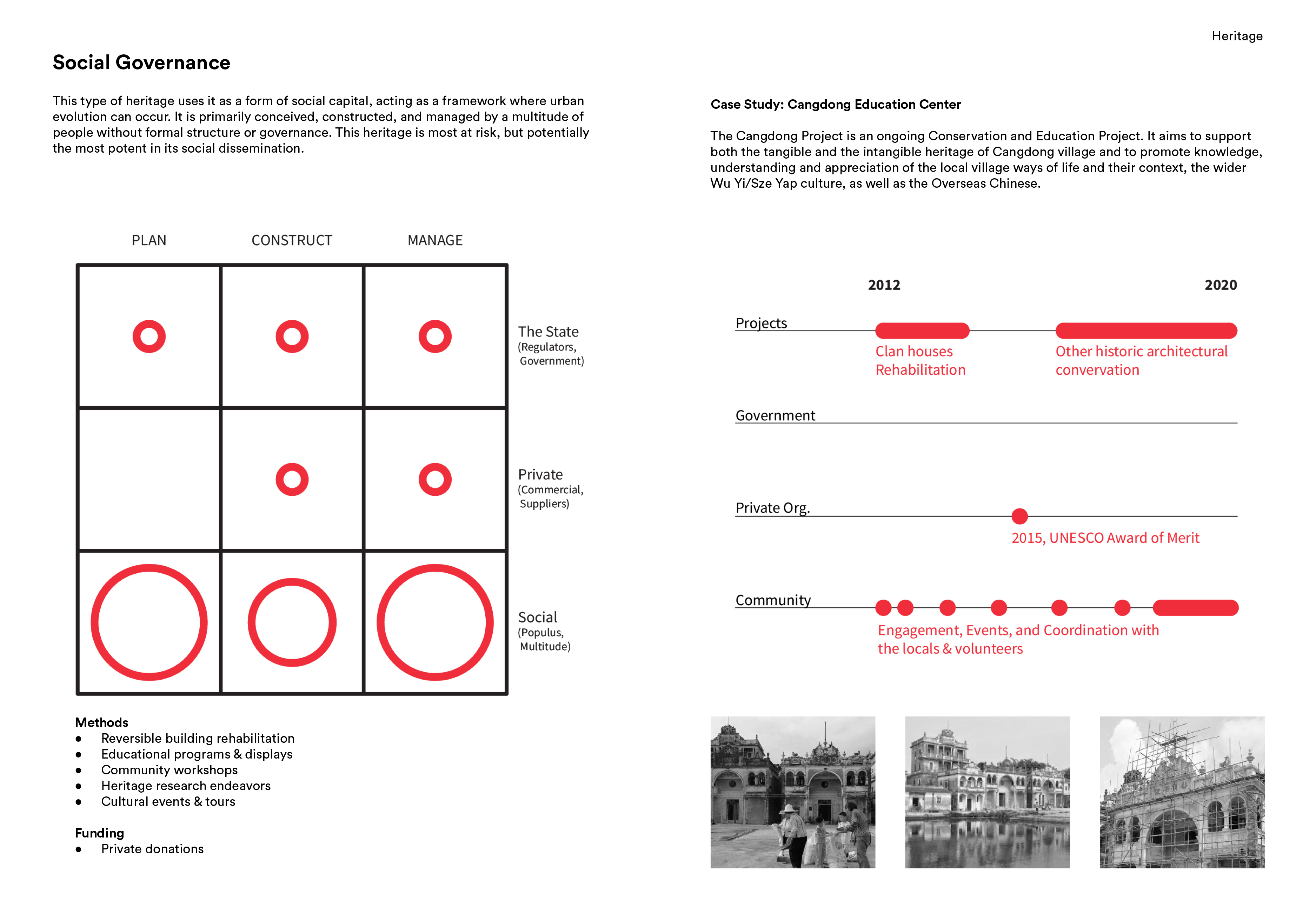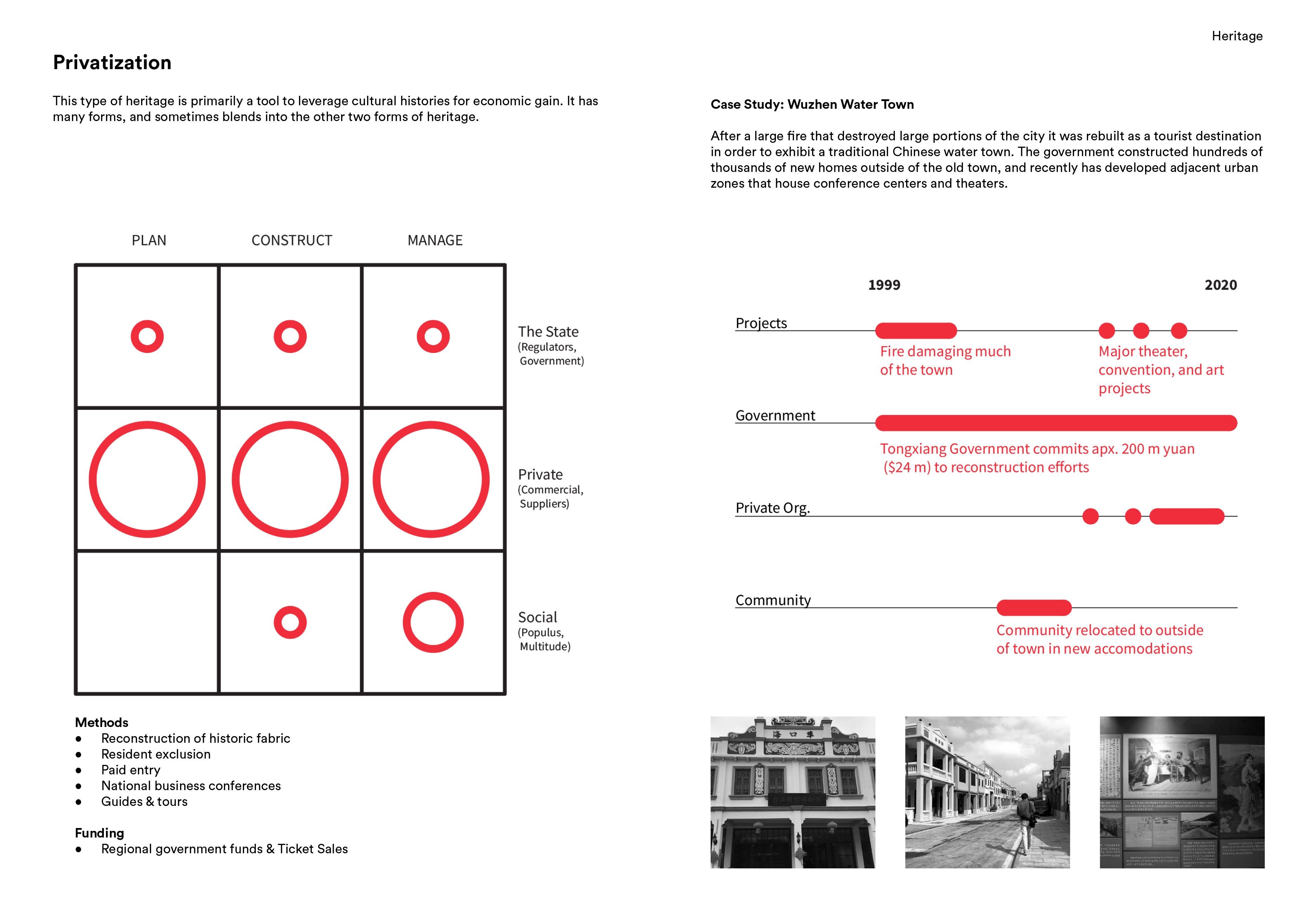Heritage
遗产
What defines a particular peoples heritage is a contested and constantly redefined list. Multiple actors, from the state to the individual each popularize and promote certain aspects in order to frame a narrative about their own culture. In Taishan, as cultural tourism is increasingly a form of economic activity, the heritage it chooses to be aligned with and promote is by its very nature selectively parsed from a broader cultural activity. As a way to structure the various heritage of the region, we have parsed both intangible and tangible heritage into three categories: social governance, state governance, and privatization. Social governance involves the most people at the lowest rungs of society. It often operates in informal ways, and under its umbrella are the things and ideas carried forth by common people and come out of unstructured happenings. State governance are properly ‘authorized’ forms of heritage, usually denoted in lists from the government, and codified into appropriate laws and regulations. These forms are the best funded forms, and receive much of the credibility that all forms of history and culture seek to self-validate with. The Chinese government in recent years has increased the breadth of what it defines as heritage (including the intangible festivals, songs, etc.), but it has also had a history of censoring topics which do not align with its official narrative. Privatization heritage are the popular methods by which heritage is spread and consumed purley for commercial profit. These forms of heritage may come in and out of the other two categories, but ultimately gain prominence through their capitalistic dissemination.
All forms of heritage wax and wane under each of these categories. However, social governance, apart from state or private heritage, lacks the capital to sustainably carry forth its truth into the next generations. In an increasingly free-market Chinese system, the very economic forces which have sidelined rural regions also seek to reaffirm pressure on its local heritage to perform in a private market, or be recognized under a system of global, national, or provincial regulation. This project, Taishan Commons, is an attempt to elevate the social heritage and seek new possibilities for its resurgence and perpetuation, apart from either exploitative capital or exclusive legislation.
遗产
What defines a particular peoples heritage is a contested and constantly redefined list. Multiple actors, from the state to the individual each popularize and promote certain aspects in order to frame a narrative about their own culture. In Taishan, as cultural tourism is increasingly a form of economic activity, the heritage it chooses to be aligned with and promote is by its very nature selectively parsed from a broader cultural activity. As a way to structure the various heritage of the region, we have parsed both intangible and tangible heritage into three categories: social governance, state governance, and privatization. Social governance involves the most people at the lowest rungs of society. It often operates in informal ways, and under its umbrella are the things and ideas carried forth by common people and come out of unstructured happenings. State governance are properly ‘authorized’ forms of heritage, usually denoted in lists from the government, and codified into appropriate laws and regulations. These forms are the best funded forms, and receive much of the credibility that all forms of history and culture seek to self-validate with. The Chinese government in recent years has increased the breadth of what it defines as heritage (including the intangible festivals, songs, etc.), but it has also had a history of censoring topics which do not align with its official narrative. Privatization heritage are the popular methods by which heritage is spread and consumed purley for commercial profit. These forms of heritage may come in and out of the other two categories, but ultimately gain prominence through their capitalistic dissemination.
All forms of heritage wax and wane under each of these categories. However, social governance, apart from state or private heritage, lacks the capital to sustainably carry forth its truth into the next generations. In an increasingly free-market Chinese system, the very economic forces which have sidelined rural regions also seek to reaffirm pressure on its local heritage to perform in a private market, or be recognized under a system of global, national, or provincial regulation. This project, Taishan Commons, is an attempt to elevate the social heritage and seek new possibilities for its resurgence and perpetuation, apart from either exploitative capital or exclusive legislation.
定义一个民族或群体的遗产是一个主观的、不断重新定义的过程。从国家到个人,多尺度、多方面的参与者以不同角度和形式促进着遗产保护,为自己的文化构建所需的故事框架。在台山,随着文化旅游越来越成为一种可行的经济活动形式,如何有选择性地保护与传承遗产显得至关重要。在本项目中,我们将非物质遗产和物质遗产的保护依—社会治理,国家治理,和私有化—三个运营模式进行了分类。
借由社群治理、传承的遗产数量最为庞大。此类遗产通常以非正式的方式运作,并且由普通民众在非结构性的组织中执行和传承。
相比之下,国家治理是一种适当“授权”的遗产形式。这类遗产会被收录于政府清单,并且其运营需应照适当的法律法规。这类遗产获得的资金最充裕,所以大多参与者都希望其遗产能得到认证。近年来,中国政府扩大了对遗产的定义(进而涵括了非物质遗产、节庆、歌曲等等),但是与主旋律不和或涉及敏感历史的主题并不能通过审查。
私人运营和管理的文化遗产的数量日益见长。近年来此类遗产被广泛地传播和发展,但通常是由于商业利益的驱使。此类遗产或是其他两类遗产发展的衍生品或前身,但它们的运营中资本主义色彩显得尤为鲜明。
每个类别各种遗产都会经历兴衰,但是其中社群治理模式最为脆弱。由于缺少资源和经济资本,社群传承的文化遗产往往难以传承。在一个日益自由市场化的中国体系中,那些曾经将农村地区边缘化的经济力量也在寻求在私人市场上推广地方遗产,或者取得国家或世界体系的认证。本“台山社会”项目尝试希望寻求社群管理遗产的新方式,提高其传承度和可持续性发展的可能性。



Local Projects
Haiping Wu’s, “Lemon Boat” Jam Shop
Chengtao Zhi’s, Antique Store & Homestay
Huixiang Zhao’s, Homestay & Canteen
Jianlin Guo’s, Homestay
Yidan Guo’s, Homestay & Cultural Education